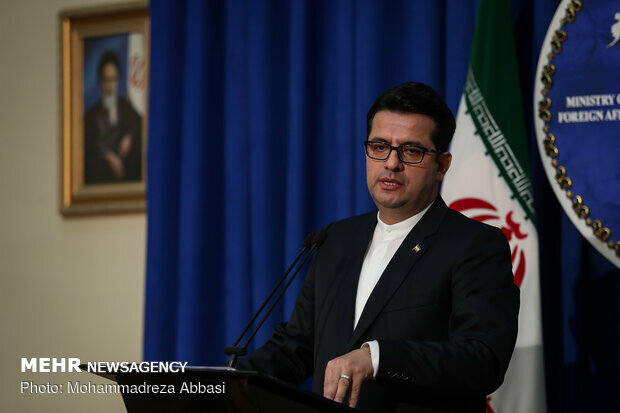Tehran says placed no order for Russian S400

TEHRAN – Tehran says contrary to a report claiming otherwise, Iran has not placed any order to buy the S-400 air defense system from Russia.
Foreign Ministry spokesman Abbas Mousavi said in his weekly press conference on Monday that Iran does not need S-400 anti-missile defense system.
“Iranian experts have devised one system that is nothing short of the S-400 missile system,” Mousavi explained.
‘We have lost our hope of INSTEX’
Regarding the European Union’s promises to save the 2015 Iran nuclear deal, the spokesman said Tehran has lost any hope of seeing the EU's long-awaited trade mechanism known as INSTEX to become operational.
“We no longer have any hope to see the INSTEX [Instrument for Supporting Trade Exchanges] in action… If the mechanism was ever going to work, it would have done so by now,” he insisted.
European signatories of the 2015 nuclear deal, including Germany, claim they are trying to keep the accord alive by launching the long-awaited INSTEX to help Iran reap some benefits from the Joint Comprehensive Plan of Action (JCPOA).
However, Iran says the Europeans have not done enough to save the nuclear deal, and the U.S. violation of the JCPOA has barred Tehran from benefiting from the economic dividends of the JCPOA.
“We expected the Europeans to fulfill their obligations to the JCPOA after the U.S. withdrawal from the pact,” Mousavi said, adding that “however, they either were not able to, or did not want to do so.”
‘No practical move by Europe to save JCPOA’
“We have not seen any practical move by the Europeans in the past days [since the 60-day ultimatum], and we hope that they will take effective actions in the remaining days otherwise we will take the second step [regarding the JCPOA commitments],” he stressed.
Running out of patience with the EU's inaction in the face of the growing U.S. pressure, Iran reduced its commitments under the deal on May 8, and warned the EU that it would consider leaving the accord if its demands were not met.
Elsewhere, Mousavi referred to German Foreign Minister Heiko Maas’s trip to Tehran, saying that the visit was focused on the JCPOA.
“The JCPOA is the base of our talks, and we will not discuss anything beyond that.”
“We strongly believe that the important matter here is the commitment of all the parties to the deal.”
Sources have said Maas coordinated his trip with France and Britain, and also discussed it with U.S. Secretary of State Mike Pompeo, creating the idea that he would seek to use the trip for pressuring Tehran to limit its missile defense program.
Iran stresses that its missile and military capabilities are first and foremost defensive and are non-negotiable.
In Abu Dhabi on Sunday, the German foreign minister said that, in his talks, he would stress his country's concerns about Iran's missile program and its influence in Syria and Yemen.
Regarding the normalization of Iran-Europe ties, the Foreign Ministry spokesman said that Tehran expected Europeans to honor their commitments regardless of what they didn’t want to do or those they weren’t able to do.
"It is very sad that in today's civilized world, one country passes extraterritorial laws not to let other countries have free trade with each other," Mousavi said.
"It is sad that we see unilateralism in the 21st century."
Answering a question about Iran's 60-day deadline to Europe, he said, "We have not seen any special move that could motivate Iran. We hope to see Europe to take a tangible practical measure in the remaining days. If not, Iran will take the other steps with strong determination. And they know it."
Asked whether the EU hesitation means that they intend to add Iran’s missile program to the JCPOA, he said, "We don’t read minds but have given an answer to what the European Union has declared. The JCPOA is the base and we don’t think about anything beyond that."
"Iran expects nothing but the JCPOA – not a word more or a word less," he reiterated.
SP/PA
